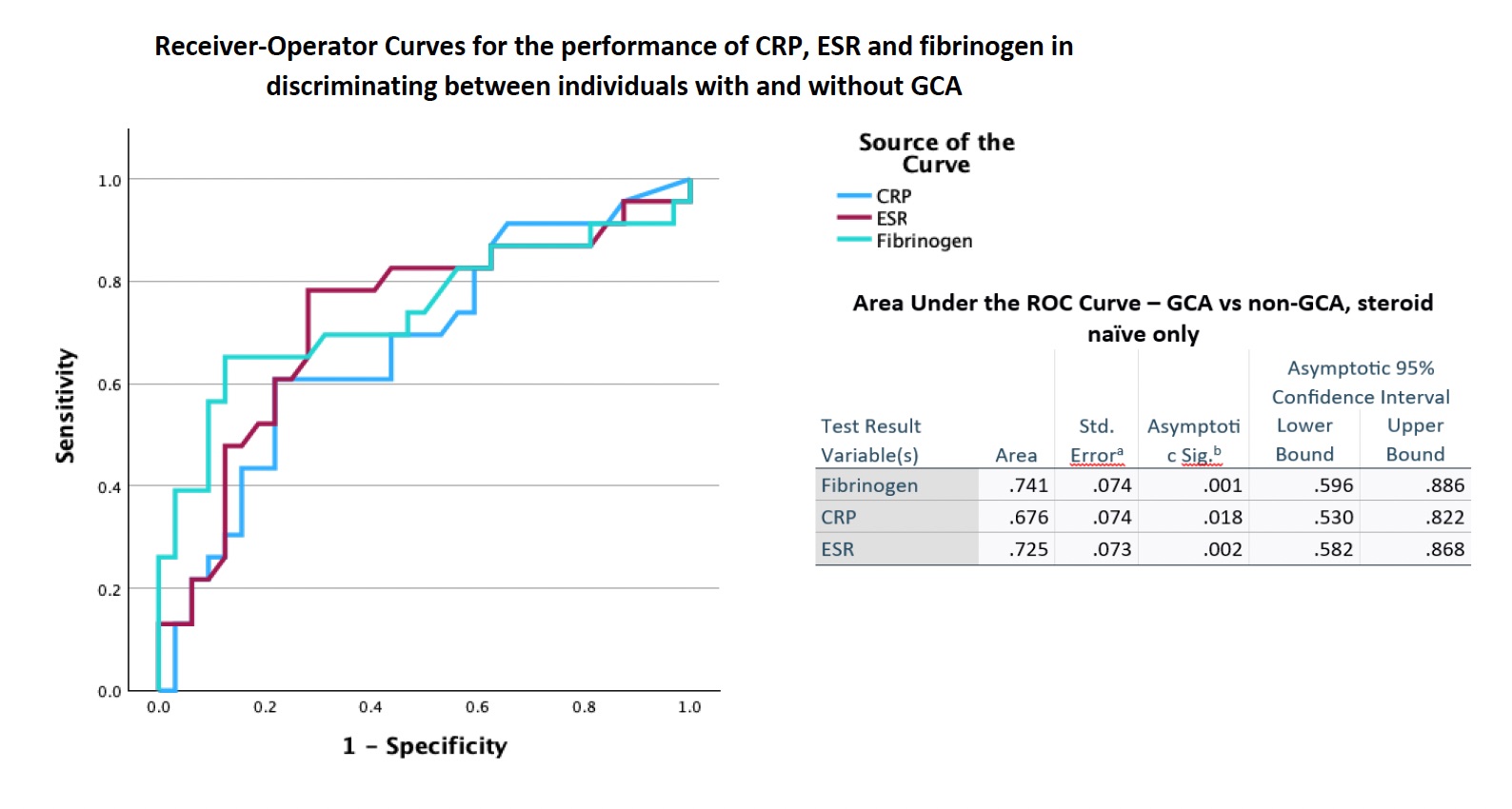Session Information
Date: Sunday, October 26, 2025
Title: (0731–0764) Vasculitis – Non-ANCA-Associated & Related Disorders Poster I
Session Type: Poster Session A
Session Time: 10:30AM-12:30PM
Background/Purpose: Giant cell arteritis (GCA) is the commonest idiopathic systemic vasculitis in adults over 50 years of age. It can be associated with high morbidity. Diagnosis is typically made by clinical and laboratory assessment, supported by imaging or histopathology from a temporal artery biopsy. C-reactive protein (CRP) and erythrocyte sedimentation rate (ESR) are often used to help distinguish between cases and noncases, however between 4-10% of patients with active GCA have normal readings for both at the time of diagnosis. Furthermore, the sensitivity and specificity of both biomarkers are reduced following administration of glucocorticoids (GC), often given empirically to reduce the risk of visual loss. Fibrinogen has previously been studied for its role as a biomarker in polymyalgia rheumatica (PMR). Data support the usefulness of assessment of plasma fibrinogen in PMR diagnosis and management.
Methods: 65 patients with GCA or large vessel vasculitis (LVV) diagnosed between 2012 and 2024 were identified across three hospital sites in Dublin, Ireland; 42 of these were receiving GC at baseline. Data were retrospectively analysed from patients’ electronic healthcare records. Blood values at baseline were identified for all, as well as during remission in 56 patients and during 22 flare episodes. The values for fibrinogen, CRP and ESR were analysed in comparison with 38 patients who attended with suspected GCA, but in whom an alternative diagnosis was made following rheumatologist assessment. Sensitivity and specificity were calculated for all three biomarkers, with adjustments made for whether patients were exposed to GC prior to blood collection at baseline. Receiver-Operator Curves (ROC) were generated for all three biomarkers, with an area-under-the-curve (AUC) calculated for each. The ROC were used to identify optimal cut-off values for fibrinogen, CRP and ESR.
Results: When individuals on GC at baseline were included, the mean fibrinogen level for patients with GCA was 4.64g/L, compared with 4.27g/L in individuals without GCA (p=0.198); mean ESR for patients with GCA was 52.5mm/hr compared with 44.8mm/hr (p=0.265) and mean CRP was 48.8mg/L compared with 42.4mg/L (p=0.56). When individuals on GC at baseline were excluded, the mean fibrinogen level for patients with GCA rose to 5.45g/L, compared with 4.27g/L in non-cases (p=< 0.001), mean ESR rose to 68.4mm/hr compared with 44.8mm/hr (p=0.03) and CRP to 68.8mg/L, compared with 42.4mg/L (p=0.071). In identifying flares, all three biomarkers perform comparably. Fibrinogen >4g/L had a sensitivity of 78.6% and specificity of 96%, CRP >5mg/L had a sensitivity of 95.2% and specificity of 74.5%, and ESR >20mm/hr had a sensitivity of 90% and specificity of 82%.
Conclusion: Fibrinogen may have a role in the diagnosis of GCA. The sensitivity of fibrinogen is substantially reduced by the introduction of GC prior to blood collection, as is that of CRP and ESR. Fibrinogen set at a cut-off value of 4.7g/L has comparable sensitivity and specificity for the presence of active GCA when adjusted for GC exposure, when compared with CRP and ESR. Fibrinogen may also be used in the detection of GCA flares, with lower sensitivity but greater specificity than ESR or CRP.
 Receiver-Operator Curves for the performance of CRP, ESR and fibrinogen in
Receiver-Operator Curves for the performance of CRP, ESR and fibrinogen in
discriminating between steroid-naive individuals with and without GCA
.jpg) Performance of fibrinogen, ESR and CRP at optimal cut-off values in diagnosis of GCA
Performance of fibrinogen, ESR and CRP at optimal cut-off values in diagnosis of GCA
To cite this abstract in AMA style:
Miller J, Cowley S, Harkins P, O'Sullivan D, McGeehan G, Molloy E, Conway R, Kane D, mcCarthy G. Fibrinogen as a biomarker in the diagnosis of giant cell arteritis and detection of flares [abstract]. Arthritis Rheumatol. 2025; 77 (suppl 9). https://acrabstracts.org/abstract/fibrinogen-as-a-biomarker-in-the-diagnosis-of-giant-cell-arteritis-and-detection-of-flares/. Accessed .« Back to ACR Convergence 2025
ACR Meeting Abstracts - https://acrabstracts.org/abstract/fibrinogen-as-a-biomarker-in-the-diagnosis-of-giant-cell-arteritis-and-detection-of-flares/
